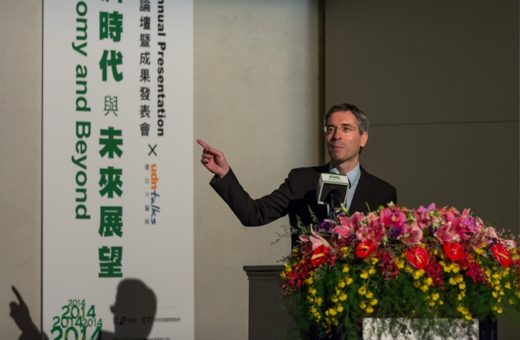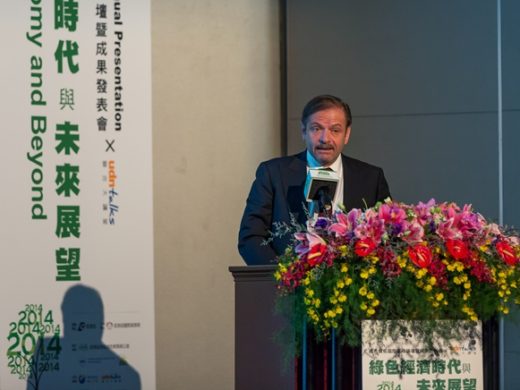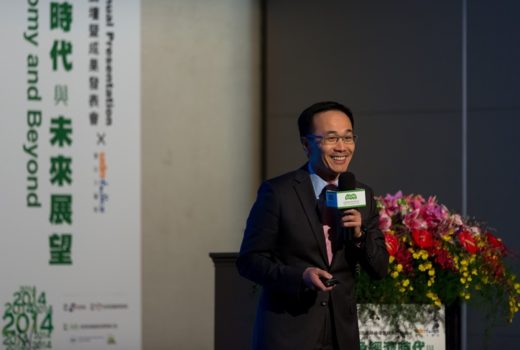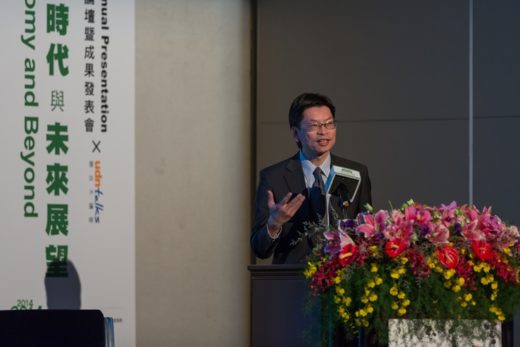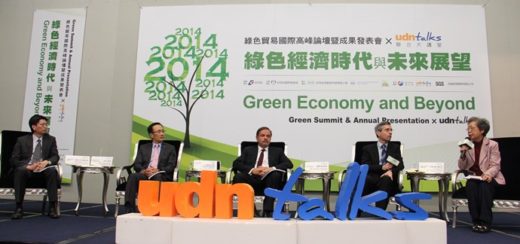LCI Report: 2014 Green Economy Summit
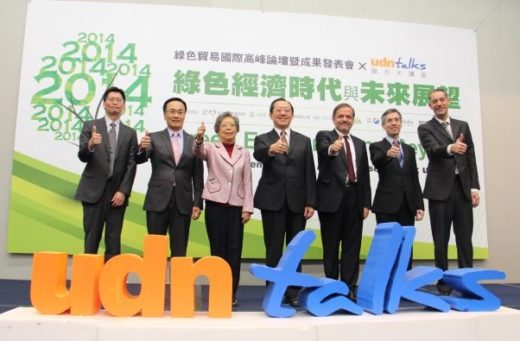
On 12 November 2014, the ECCT's Low Carbon Initiative (LCI) co-organised a half-day seminar as part of the Green Economy and Beyond Green Summit and Annual Presentation which was hosted by the Ministry of Economic Affairs (MoEA) and co-organised by the MoEA's Bureau of Foreign Trade and Green Trade Project Office (GTPO). The event featured an exhibition, opening remarks by Bernd Barkey, ECCT Executive Director and LCI Representative and David Hsu (Da-wei), Deputy Director General of the Bureau of Foreign Trade, Ministry of Economic Affairs and presentations by Frederic Laplanche, Head of the European Economic and Trade Office (EETO), three members of the LCI and a panel discussion and Q&A session moderated by Dr Yu Ning, Senior Advisor of the Environment and Development Foundation.
The four LCI speakers were interviewed by ICRT and IC Broadcasting Stations on site, and their presentions videotaped by United Daily News to be soon placed onUDN Talks website.
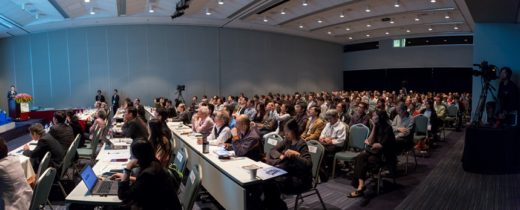
Please view the conference report and the speakers' presentations (PDF and Video) as follows:
Guests of honour:
· Bernd Barkey, ECCT Executive Director and LCI Representative
· David Hsu (Da-wei) Deputy Director General, Bureau of Foreign Trade, Ministry of Economic Affairs
Moderator:
· Dr Yu Ning, Senior Advisor, Environment and Development Foundation
Speakers:
· Frederic Laplanche, Head, European Economic and Trade Office (EETO)
· Giuseppe Izzo, Regional Vice President and Taiwan General Manager, STMicroelectronics' Greater China and South Asia Region
· Thomas Fann, President, Ford Lio Ho
· Vincent Tseng, Director, Corporate Strategy and Business Development, Philips Taiwan
Opening remarks
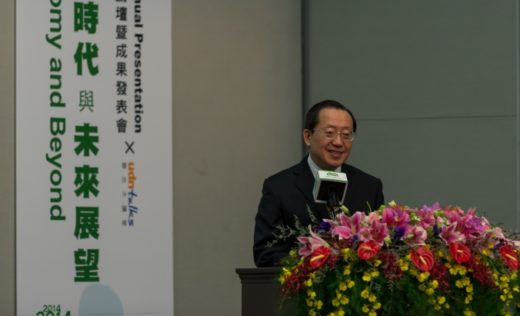
In his opening remarks, Deputy Director-General said that green issues have generated world-wide attention and there is a general consensus that the green industry can stimulate economic development as well as solve environmental problems. Promoting green industry is also a priority for the government, which is why the MoEA set up the Green Trade Project Office (GTPO) to promote local products for export. He added that this event was arranged in cooperation with the ECCT's LCI with a view towards learning from Europe and spurring more cooperation between academia, industry and governments in Europe and Taiwan.
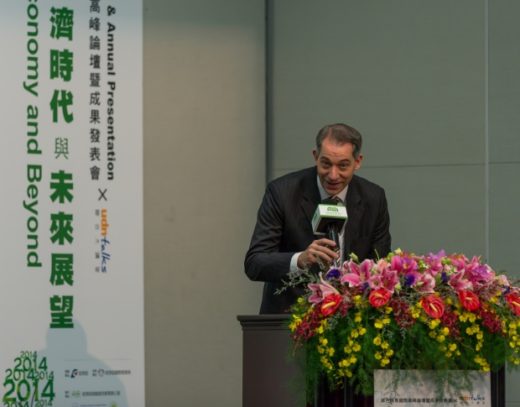
In his remarks ECCT Executive Director Bernd Barkey referred to a commitment made by European Union leaders in October 2014 to cut CO2 emissions to 40% below 1990 levels and to increase the use of renewable energy to 27% of the total energy mix by the year 2030. He said that this important announcement is a strong signal of Europe's commitment to sustainability and the green economy and it should also be seen as a great opportunity for the Taiwan government, the industry and the people of Taiwan. He noted that Taiwan has the potential to set and reach much higher targets both for cutting emissions and renewable energy and that meeting the EU's ambitious targets will necessitate much higher standards for energy efficiency. Companies that produce devices, materials and components in the most efficient processes that use fewer raw materials, are lighter and more energy efficient, will win more business. This is therefore an opportunity for innovative companies to upgrade their skills and processes and move up the value chain. There will also be much more business for companies involved in offering products and services to produce and store renewable energy, electric vehicles and create smart grids and smart buildings. It is in therefore in the interests of Taiwan's government, industry and people to embrace this trend. He added that the green economy is not only good for the environment and sustainability. It also creates high value-added goods and services, good jobs and tax revenue for the government, completing a virtuous circle.
Topic: Green economy, green trade - View from the European Union
Speaker: Frédéric Laplanche, Head, European Economic and Trade Office (EETO)
Video: http://udntalks.udn.com/videos_detail.php?id=204
In his presentation Laplanche said that we need to move beyond the narrow definition or sense of what green economy refers to (environmental goods and services such as water treatment and waste management focused on environmental goods and services, protection of biodiversity and landscapes) to integrate sustainable practices into every aspect of the economy. For example, we need to develop greener ways of producing goods and making products that have less impact on the environment and are more energy efficient so that they use less energy during the course of their lifetimes. We also have to improve the way we produce food (agriculture).
The latest opinion polls show that the majority of people in the EU consider protecting the environment as either very important (53%) or fairly important (42%), implying that 95% of EU citizens are concerned about the environment. On the issue of climate change, 69% of people think it is a serious problem while 21% think it is fairly serious, once again showing that the vast majority (90%) of EU citizens are concerned about climate change. The main issues related to the environment that people think are priorities are air pollution, water pollution, the impact of chemicals and the growing amount of waste. According to Laplanche, these represent problems but also opportunities.
It is often argued that we have to make a choice between economic development and protecting the environment but opinion polls in Europe show that 59% of people believe that the government should pay more for green public procurement. Moreover, BusinessEurope, the largest industry association in Europe has recommended setting ambitious and binding emission reduction targets, indicating that even business groups are in favour of stricter rules, standards and targets.
All these indicate that there is very strong consensus from the public, green NGOs and business in the EU to move towards a green economy and that it is possible.
Europeans also believe that going green can help Europe to become more competitive. On the question as to whether protection of the environment will boost the economy 29% totally agree while 45% tend to agree. This indicates that the majority of Europeans believe that it is possible to have economic development and protect the environment at the same time.
Figures also back this up. The EU has good track record. It reduced emissions by 17% between 1990 and 2010 while economic growth increased by 45%. This was done by various measures such as introducing strict building codes and improving energy efficiency in industry. Buildings in Europe now use 50% less energy compared to 25 years ago over their lifetimes while European industry is 19% less energy intensive. There are also economic benefits. The eco-industry has grown 6-8% per year on average and created four million jobs. The renewable energy sector is growing by 13% a year and recycling by 18% a year. Besides creating jobs to produce green products and provide related services, the EU's strict building codes has created jobs such as trainers to teach construction workers how to make buildings energy efficient.
The EU's GHG emission reduction targets of a 20% cut by 2020, 40% by 2030 and 80% by 2050 are very ambitious targets but not unfeasible. Renewable energy targets will be difficult to reach but it is important for government to give the industry a roadmap so that they have time to invest and prepare.
Laplanche concluded that there will be a lot of opportunities for green trade between Taiwan and the EU as well as cooperation in green research. While there is growing awareness on the part of the public in Taiwan of environmental issues, the industry is not as enthusiastic. However, it is in the interests of industry to embrace the global trend or else risk losing competitiveness.
Topic: The green combination of power and the digital world
Speaker: Giuseppe Izzo, General Manager, STMicroelectronics
Video: http://udntalks.udn.com/videos_detail.php?id=205
PDF: 02_尹容總經理_從智慧家庭角度看綠能.pdf
In his presentation, Izzo highlighted some of ST's green industry products from energy management and energy savings to trust and data security, from healthcare and wellness to smart consumer devices, in the home, office or car.
STMicroelectronics provides key technologies to build smart grids which optimize energy consumption, make the entire electricity distribution system more flexible, reliable, and increases the use of renewable energy sources on a large scale. The technical enablers for smart homes are smart devices which are in turn enabled by smart sensors and smart controllers. Smart sensors measure conditions in the environment and provide information to smart controllers to make a decision on what action to take. ST brings advanced semiconductor technology to sensor components, making them smaller, more energy-efficient and integrating them with advanced controllers for intelligent decision-making and connecting to other devices and the external world.
There are an increasing number of greener electronic products in the home. At the moment these are disconnected but, increasingly, these devices will be integrated to create a smart interconnected home. The first key element is a home plug, specifically designed for building a smart energy system.
ST started smart metering 15 years ago. In Italy and Spain every home has a smart meter and Taiwan is starting to use smart meters. This development is important because the future of power generation will be from many sources. There is no smart grid without smart meters. Every household has to use energy efficiently and use power in off-peak periods when it is cheaper. These building blocks help users to use power at the optimal time and most efficiently. Smart metering puts intelligence into power.
Looking ahead at future trends, video traffic is doubling every 18 months. A lot of this will be between the home and connected devices.
Topic: Mobility solution blueprint
Speaker: Thomas Fann, President, Ford Lio Ho
Video: http://udntalks.udn.com/videos_detail.php?id=207
Ford's plans for the future are in line with international trends. The company sees many opportunities in the green economy and Taiwan can take part in the green trend. Ford is constantly working to make its cars more efficient as well as its production process greener. For example, the company saved 600 million tonnes of water world-wide in the past five years. It is also making its production and supply chains greener as well as its offices. Much of Ford's technology is now developed in Europe.
Taiwan has 7.3 million registered cars in Taiwan, many of which are old and dirty. This is why the industry is calling for a mechanism to phase out old cars and replace them with newer, cleaner models that produce fewer emissions.
Fann made the point that green vehicles should not be limited to electric vehicles as it will take decades to build the necessary infrastructure that will enable a transition to electric mobility. Besides charging, other factors also need to be considered such as recycling of batteries. In the meantime, fuel efficient cars and hybrids will play an important role. According to Fann, there are 140 ways to reduce emissions such as by reducing the weight of vehicles by using better and cheaper materials. The industry also needs to work to make green cars more affordable.
We need more creative solutions to resolve transportation issues. Expect to see more driverless cars and smarter traffic control solutions in future. Since traffic jams waste time and fuel, we will need smarter logistics and connectivity to optimize travel routes and reduce travel time for everyone.
Ford is working on a number of pilot projects around the world and said there is a need for similar projects in Taiwan but these need to be properly coordinated at the national level rather than the local level.
Topic: Corporate green competitiveness and strategy
Speaker: Vincent Tseng, Director, Corporate Strategy and Business Development, Philips Taiwan
Video: http://udntalks.udn.com/videos_detail.php?id=206
PDF: 04_曾正忠策略長_企業綠色競爭力與策略-飛利浦循環經濟.pdf
Tseng gave an introduction to the concept of the "circular economy". The traditional linear economic model of extracting minerals, making products and then discarding them wastes a lot of resources, many of which can be re-used.
The rising level of middle class consumers all over the world implies more consumption. If current consumption trends continue, by some estimates, we will require five planet earths by 2030. To be sustainable we need a different economic model, a circular economy.
In a circular economy, nothing is wasted. Once goods have reached the end of their useful lives, there are several options: maintain/refurbish, remanufacture and resell, replace unusable parts and harvest and reuse or recycle discarded parts. Reusing all materials will not only stop resource depletion but would also help to solve parts and components shortages and can reduce costs by €250-500 billion per year in Europe.
Tseng gave an example of how Philips is making the circular economy happen. It has started a new business model that shifts from providing products to providing services. Instead of buying lighting equipment from Philips, customers just need to sign a lighting service contract. Philips provides the lights, equipment, conducts regular maintenance and upgrades and then recycles the equipment when it reaches the end of its life. The beauty of this model is that it does not require difficult decisions on the part of companies on whether to buy expensive equipment upfront. It also takes pressure off them to maintain or to recycle their systems because the service provider takes care of this.
Topic: Efforts and achievements of local business
Moderator: Dr Yu Ning, Senior Advisor, Environment and Development Foundation
Video: http://udntalks.udn.com/videos_detail.php?id=209
Before moderating the panel discussion, Dr Ning gave a brief introduction to local efforts and the achievements of local business in green industry in Taiwan. She introduced Taiwan's scheme for environmental labelling. For products to gain the EPA's ROC green label, there is a strict process and only the best 20-30% of products meet the requirements. The government has been promoting the procurement of green products since 1999 and it has been mandatory since 2003 for government agencies to buy green products and report the results to the EPA. The annual targets for purchasing green products has been steadily rising every year since then. The target for 2013 was 93% of spending on green products in 34 designated product categories.
